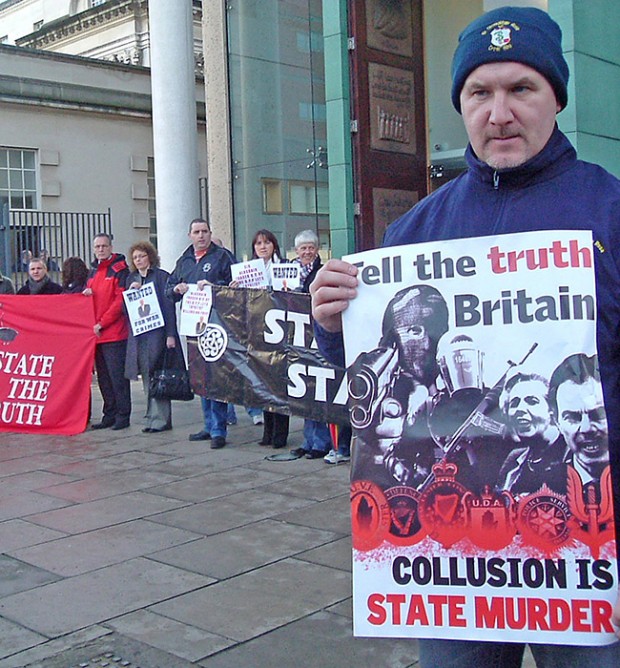1 August 2016 Edition
Reconciliation processes must be inclusive and owned by all – Seamus Finucane
UNCOMFORTABLE CONVERSATIONS

• Now is the time to address the consequences of the conflict
Early experiences of sectarian state violence shaped and influenced the direction of my life, the lives of my family and my community
RECONCILIATION PROCESSES must be inclusive and owned by all. As a process they create a space that invites us all – republican, unionist, British or Irish – to make sense of our history, to understand others, to challenge and be challenged, with the common objective of building a better future that promotes equality and which protects the rights of all.
At its core, reconciliation processes are an invitation to build relations between people who have experienced violent conflict, repression and suffered injustice.
Here in Ireland, a reconciliation process invites us all to rebuild and redefine new sets of relationships within and between communities and between these communities and the state which, in the past, was exclusive and discriminatory.
Reconciliation is about building for the future, that our violent past will never again be repeated.
For many republicans, the Northern state from partition resonated with the apartheid system in South Africa. The “Orange State” governed through a “Protestant Parliament for a Protestant People” slogan that defined systemic exclusion. The Northern state was a ‘cold house’ for Northern republicans and nationalists where we were treated as second-class citizens, reflected in discrimination in housing, employment, education, health and the general lack of opportunities to improve our quality of life.
This systemic exclusion was tightly regulated by the state through the RUC and the B-Specials police reservists whose sole purpose was to suppress the nationalist and republican people. If we are serious about ‘Uncomfortable Conversations’ as the vehicle to build for the future, this experience must be acknowledged.
It is not exaggerated; it is not a myth; it is a living experience that resonated for generations.
It was the politics of exclusion, regulated through state force, that erupted in the late 1960s when the peaceful civil rights campaign was met with state repression and violence. This culminated in the sectarian pogroms of 1969. The early bombings and killings of this period were the primary responsibility of the unionist population. These facts are often ignored.
Yet if we are serious about genuine reconciliation it is incumbent on unionism and the British state to acknowledge how their politics of force and coercion from partition perpetuated what was a ‘living nightmare’ for many republicans and nationalists. These early experiences of sectarian state violence shaped and influenced the direction of my life, the lives of my family and my community.
In the decades that followed, these influences of exclusion and fear manifested itself in its different guises, perpetuating class division through sectarian politics, British military intervention and republican resistance. This has created a legacy experience that is itself as contested as it is divisive but engage with the past and build for the future we must. This means engaging and listening to the other.
We must all be receptive to the ‘Uncomfortable Conversation’. This will be particularly difficult as this society come to terms with the pain, loss and heartbreak of the past.
Now is the time to address the consequences of the conflict and, as importantly, engage with the causes that gave rise to conflict.
There is a huge onus on all of us – republican, unionist, British or Irish – to collectively apply ourselves to progressing all legacy matters in a human rights compliant manner.
The truth of victims is the real truth of society. Collectively we need to break the cycle of denial and cover-up. We need to challenge the impunity and dismantle the secrecy to allow the healing process to take place.
The past will never go away as long as people remember injustice.
Equally, there are multiple narratives about the origins of the conflict. The live challenge, however, is to acknowledge and understand how these narratives serve as psychological barriers that are also used to politically wage war with ‘the other’.
Of course I have my experiences of the past but I want to listen to and engage with others who have a different understanding. Reconciliation will only work when it is inclusive and owned by all.
As things stand, few are leading on reconciliation but sadly even less people are following. Reconciliation is not the sole responsibility of republicans. It is an issue for all of society to promote. We have before us an opportunity to finally engage with the legacy of the past and in so doing shape processes that will embed, support and enhance reconciliation.
Engaging with ‘the other’ and acknowledging their experiences of conflict is but the first step. This will take time. However, only when reconciliation processes are inclusive and owned by all will they deliver for society.
Seamus Finucane is a lifelong political and community activist. He is member of Sinn Féin in Belfast
Editor’s Note: Guest writers in the Uncomfortable Conversations series use their own terminology and do not always reflect the house style of An Phoblacht.




